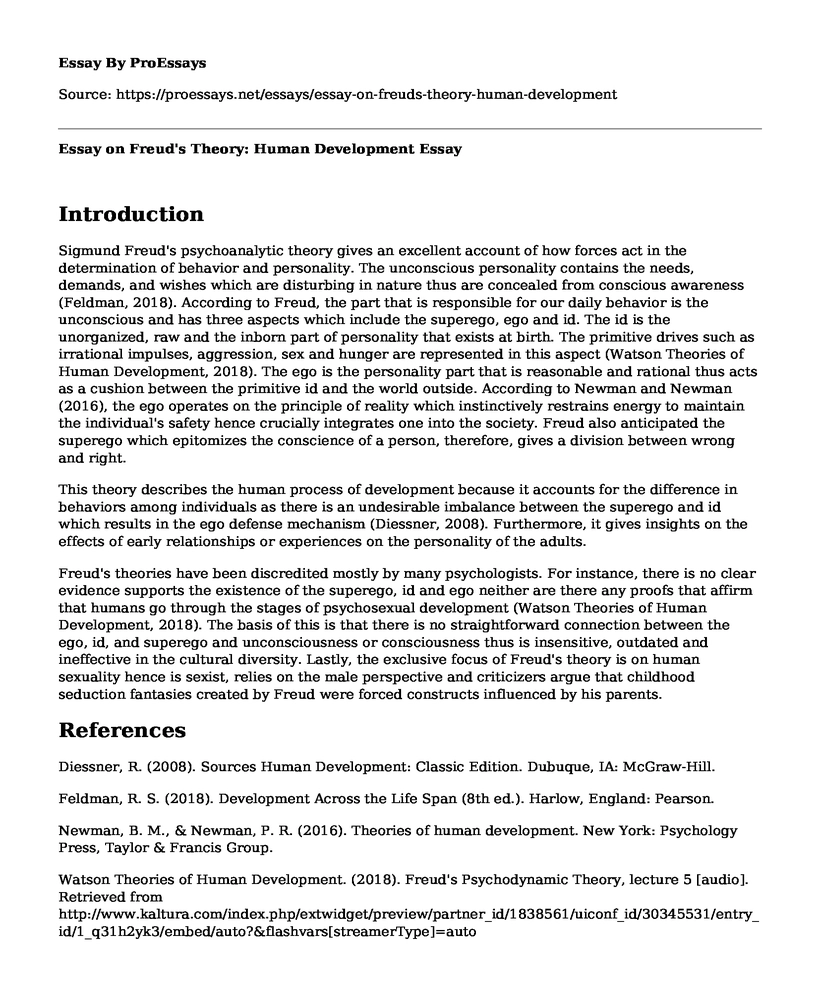Introduction
Sigmund Freud's psychoanalytic theory gives an excellent account of how forces act in the determination of behavior and personality. The unconscious personality contains the needs, demands, and wishes which are disturbing in nature thus are concealed from conscious awareness (Feldman, 2018). According to Freud, the part that is responsible for our daily behavior is the unconscious and has three aspects which include the superego, ego and id. The id is the unorganized, raw and the inborn part of personality that exists at birth. The primitive drives such as irrational impulses, aggression, sex and hunger are represented in this aspect (Watson Theories of Human Development, 2018). The ego is the personality part that is reasonable and rational thus acts as a cushion between the primitive id and the world outside. According to Newman and Newman (2016), the ego operates on the principle of reality which instinctively restrains energy to maintain the individual's safety hence crucially integrates one into the society. Freud also anticipated the superego which epitomizes the conscience of a person, therefore, gives a division between wrong and right.
This theory describes the human process of development because it accounts for the difference in behaviors among individuals as there is an undesirable imbalance between the superego and id which results in the ego defense mechanism (Diessner, 2008). Furthermore, it gives insights on the effects of early relationships or experiences on the personality of the adults.
Freud's theories have been discredited mostly by many psychologists. For instance, there is no clear evidence supports the existence of the superego, id and ego neither are there any proofs that affirm that humans go through the stages of psychosexual development (Watson Theories of Human Development, 2018). The basis of this is that there is no straightforward connection between the ego, id, and superego and unconsciousness or consciousness thus is insensitive, outdated and ineffective in the cultural diversity. Lastly, the exclusive focus of Freud's theory is on human sexuality hence is sexist, relies on the male perspective and criticizers argue that childhood seduction fantasies created by Freud were forced constructs influenced by his parents.
References
Diessner, R. (2008). Sources Human Development: Classic Edition. Dubuque, IA: McGraw-Hill.
Feldman, R. S. (2018). Development Across the Life Span (8th ed.). Harlow, England: Pearson.
Newman, B. M., & Newman, P. R. (2016). Theories of human development. New York: Psychology Press, Taylor & Francis Group.
Watson Theories of Human Development. (2018). Freud's Psychodynamic Theory, lecture 5 [audio]. Retrieved from http://www.kaltura.com/index.php/extwidget/preview/partner_id/1838561/uiconf_id/30345531/entry_id/1_q31h2yk3/embed/auto?&flashvars[streamerType]=auto
Watson Theories of Human Development. (2018). Freud's Psychosexual Stages, lecture 7 notes [audio]. Retrieved from http://www.kaltura.com/index.php/extwidget/preview/partner_id/1838561/uiconf_id/30345531/entry_id/1_yvba9gvk/embed/auto?&flashvars[streamerType]=auto.
Cite this page
Essay on Freud's Theory: Human Development. (2022, Jul 15). Retrieved from https://proessays.net/essays/essay-on-freuds-theory-human-development
If you are the original author of this essay and no longer wish to have it published on the ProEssays website, please click below to request its removal:
- Influence of Technology on Public Speaking Skills and Listeners Essay
- Evaluating the Professionalism of Real Estate Agents Paper Example
- Problems Across the Capsian Sea Essay
- Empathy, Narrative, and Victim Impact Statements Paper Example
- Essay Sample on Explaining the Beliefs Among Different Societies Regarding Mental Illness
- Genes Affect Cognitive Processes - Essay Example
- Christianity View of Suicide - Essay Sample







